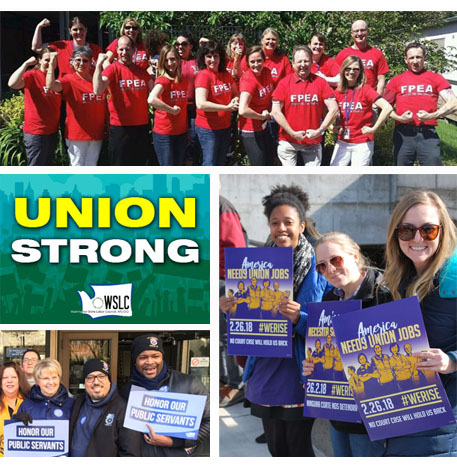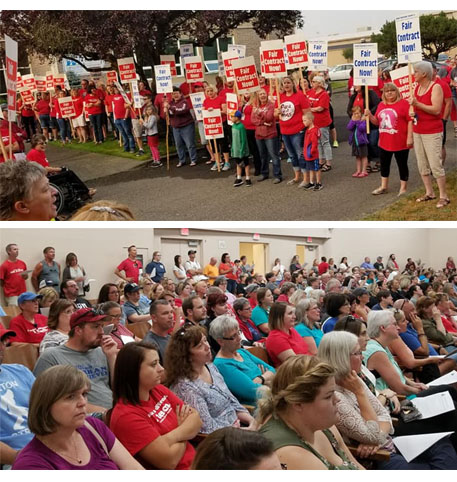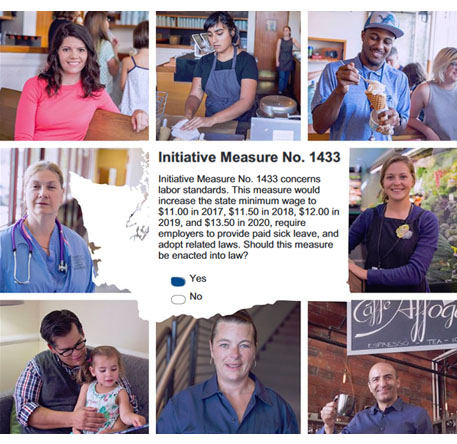TAKE A STAND!
After Janus, unions got even stronger in state
Far fewer workers in Washington are withdrawing from their unions
By DAVID GROVES
 (Feb. 13, 2019) — Lost amid news coverage of Washington state’s extraordinary 10 percent jump in union membership last year is a statistic that may surprise some in the post-Janus era. Although that 2018 U.S. Supreme Court decision empowered all public employees to withdraw from their unions and get representation for free, the number of Washingtonians who chose to do that dropped by more than half last year, according to the federal Bureau of Labor Statistics.
(Feb. 13, 2019) — Lost amid news coverage of Washington state’s extraordinary 10 percent jump in union membership last year is a statistic that may surprise some in the post-Janus era. Although that 2018 U.S. Supreme Court decision empowered all public employees to withdraw from their unions and get representation for free, the number of Washingtonians who chose to do that dropped by more than half last year, according to the federal Bureau of Labor Statistics.
The latest BLS union membership report estimated that 22,000 Washington workers had jobs covered by a union contract in 2018 but were not dues-paying members of their union. That number is down from 46,000 in 2017. That means more than half of the folks with union representation who weren’t full dues-paying members two years ago decided last year — the year the Janus decision took effect — to rejoin their unions and become full members.
More rank-and-file members in Washington state are sticking with their unions, including thousands who previously did not.
In fact, according to the BLS estimates, Washington now has the lowest percentage of “union withdrawals” of any state in the country. Only 3.3 percent of workers covered by a union contract in Washington have declined to become full dues-paying members in this state. By comparison, Oregon’s withdrawal rate was 5.5 percent, California’s was 7 percent, and Idaho, an anti-union “right to work” state that allows non-members in both the public and private sectors to get union representation for free, was 17.1 percent. The national withdrawal rate was 10 percent.
You can credit a number of factors for Washington unions’ remarkable success in solidarity:
 ► Unions in Washington state were prepared for the Janus decision. More than a year before Janus was decided, unions knew that the court’s conservative majority was bent on such an attack. In preparation, many public employee unions in Washington launched unprecedented internal organizing campaigns to remind existing members of the importance of sticking together to stay strong. They also sought to reengage withdrawn and inactive members to demonstrate the value of the union.
► Unions in Washington state were prepared for the Janus decision. More than a year before Janus was decided, unions knew that the court’s conservative majority was bent on such an attack. In preparation, many public employee unions in Washington launched unprecedented internal organizing campaigns to remind existing members of the importance of sticking together to stay strong. They also sought to reengage withdrawn and inactive members to demonstrate the value of the union.
The Washington State Labor Council, AFL-CIO hosted a Building Strong Unions summit months before the Janus decision to highlight and share the best practices for internal organizing that were being used by various affiliated unions. A number of private-sector unions not directly affected by the Janus decision participated and also launched campaigns to reengage existing members.
 ► Teachers and others demonstrated the value of strong unions. In 2018, teachers with the Washington Education Association and other unionized public school employees from across the state lobbied, rallied, and in several cases, went on strike for better wages. There was strong solidarity on picket lines and at demonstrations, both internally and from other unions and community supporters backing the teachers. In the end, most teachers won double-digit pay increases and other important gains.
► Teachers and others demonstrated the value of strong unions. In 2018, teachers with the Washington Education Association and other unionized public school employees from across the state lobbied, rallied, and in several cases, went on strike for better wages. There was strong solidarity on picket lines and at demonstrations, both internally and from other unions and community supporters backing the teachers. In the end, most teachers won double-digit pay increases and other important gains.
Nothing demonstrates the power of a strong union like success at the bargaining table. And collective action by many other Washington workers accomplished that in 2018 for all to see — from heavy equipment operators (IUOE), to university academic employees (UAW), to hotel workers (UNITE HERE), to state employees (WFSE, Teamsters, SEIU and others), to nurses and hospital workers (WSNA, SEIU, UFCW and others).
These workers won contracts that showed the power of solidarity to their members and the public.
► Washington is a Union State. As we celebrate the 100th anniversary of the 1919 Seattle General Strike, many historians note that Washington has always been a populist pro-worker state with deep skepticism about corporate control. A century of peaceful and successful collective action at Boeing, in our state’s construction trades and at grocery stores, to name a few, have demonstrated the value of unions.
With 19.8 percent of Washington’s workforce unionized, our state has the the third highest union density in the nation (behind only New York and Hawaii). In 2018, Washington’s unions grew by 65,000, according to BLS data, and now number almost 650,000 rank-and-file members.
 Not only have Washington’s unions effectively advocated for their members, they have publicly fought for and won groundbreaking labor standards for all workers in Washington state. Those include a relatively high minimum wage that’s indexed to increase automatically, paid sick leave for all workers, strong state-run safety nets for injured and laid-off workers, work safety standards that exceed federal minimums, workforce training and apprenticeship programs that are national models, and now, a groundbreaking paid family and medical leave insurance program.
Not only have Washington’s unions effectively advocated for their members, they have publicly fought for and won groundbreaking labor standards for all workers in Washington state. Those include a relatively high minimum wage that’s indexed to increase automatically, paid sick leave for all workers, strong state-run safety nets for injured and laid-off workers, work safety standards that exceed federal minimums, workforce training and apprenticeship programs that are national models, and now, a groundbreaking paid family and medical leave insurance program.
These progressive pro-worker gains have each been decried by Washington’s corporate lobbyists and think tanks as anti-business “job killers.” And yet, Washington’s thriving economy, educated and skilled workforce, diverse and stable industrial base, and low unemployment are the envy of the nation. In fact, site selection experts and national publications consistently rank Washington as one of the best states — if not the very best state — to do business in America.
It’s worth noting that Washington’s unions are rapidly growing — and far fewer members are withdrawing — at a time that billionaire-backed anti-labor groups like the Freedom Foundation have stepped up efforts to capitalize on the Janus decision and try to persuade union members to opt out of membership.
Washington workers aren’t buying their snake oil.
We understand the value of joining together — and sticking together — in unions to negotiate for a better life for our families. We know that strong unions are what created America’s middle class. And we know that right-wing fringe groups financed by billionaire industrialists do not have our best interests at heart.
That’s why we are staying Union Strong in Washington!
If you want to find out how the power of a strong union can help you and your co-workers, contact a union organizer today.
David Groves is Editor of The Stand.





